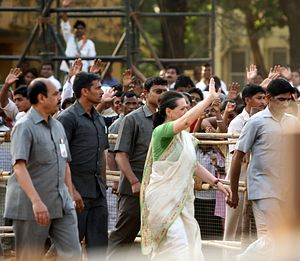Former Indian Prime Minister Manmohan Singh and the president of the Congress Party, Sonia Gandhi, are both known as two of the most reticent political figures in India. When both of them speak to the media on the same day, it can only mean something has happened to alarm them.
A revelation by a former colleague is what has alarmed these Congress leaders. Natwar Singh was a close confident of Sonia Gandhi until 2007, before the two parted ways on a very bitter note. Singh had been close to the Gandhi family for over four decades. However, in 2007, a committee indicted Natwar Singh and his son for abusing their positions to secure private benefits in a procurement scandal associated with the United Nation’s oil-for-food program during Saddam Hussein’s rule in Iraq. Sonia Gandhi felt betrayed and did not defend Singh. Ultimately, Singh resigned from the Congress Party, his political career finished. Singh was especially resentful of Gandhi because he felt she did not give him a chance to explain himself.
Singh has recently written an autobiography entitled One Life is Not Enough in which he alleged that Sonia Gandhi did not become Prime Minister in 2004—when the Congress Party won the elections—because of adamant opposition from her son, Rahul Gandhi. Rahul Gandhi was afraid that his mother would be assassinated in the same way his father and grandmother were. Rajiv Gandhi and Indira Gandhi—both Prime Ministers—were assassinated.
In a television interview prior to the release of his book, Singh contradicted the popularly held idea that Sonia Gandhi followed an “inner voice” that led her to reject the Prime Minister’s post. Instead, Manmohan Singh was chosen by the Gandhi family to be Prime Minister after Rahul gave his mother a 24-hour ultimatum to turn down the position. This revelation hurt the Congress Party’s narrative. The party prided itself on Sonia Gandhi’s “sacrifice” in rejecting the post of the Prime Minister.
Additionally, Singh revealed that Sonia Gandhi had access to government files and was privy to all major decisions during the Manmohan Singh government, despite not having an official position. However, this was widely known to the public. Similar information was revealed by Sanjay Baru, Manmohan Singh’s former media advisor in a book published a few months ago. The book, The Accidental Prime Minister portrayed Manmohan Singh’s government as being run by Sonia Gandhi’s remote control.
The timing of the present revelation is unfortunate for the Congress Party, coming at a time when it is grappling with an existential crisis. Such revelations will further demoralize the cadres. This explains why both Sonia Gandhi and Manmohan Singh were quick to contradict Natwar Singh’s account. Commenting on Natwar Singh’s interview, the Congress president said that she would write her own book to reveal the truth. “I saw my mother-in-law riddled with bullets, [and] saw my husband assassinated. Why should I feel hurt? I am far from getting hurt by these allegations,” Gandhi said.
Singh also refuted the charge made by his former colleague and attributed commercial motive to the revelation. Reacting to Natwar Singh’s charge that Rahul Gandhi influenced his mother’s decision in 2004, Singh said that “private conversations should not be misused for capital gains.”
The fact that Sonia Gandhi and her daughter met Natwar Singh before the release of his book in order to ask that he reconsider certain parts of it lends credence to the truth of his words. However, there were probably other factors at stake, such as the discomfort of the Indian population in having a foreign-born Prime Minister (Gandhi is Italian). It is also possible that Natwar Singh exaggerated parts of his book to help the political career of his son, who has since joined the ruling Bharatiya Janata Party (BJP). Certainly, the revelations in the book cast further shadows on Rahul Gandhi’s leadership abilities.
Despite all this, the book is an accurate description of the events that occurred. It is a full-fledged political autobiography, a genre which is still relatively underdeveloped in India. India could benefit from more such works, which could shed more light on the opaque world of Indian politics for the masses.

































